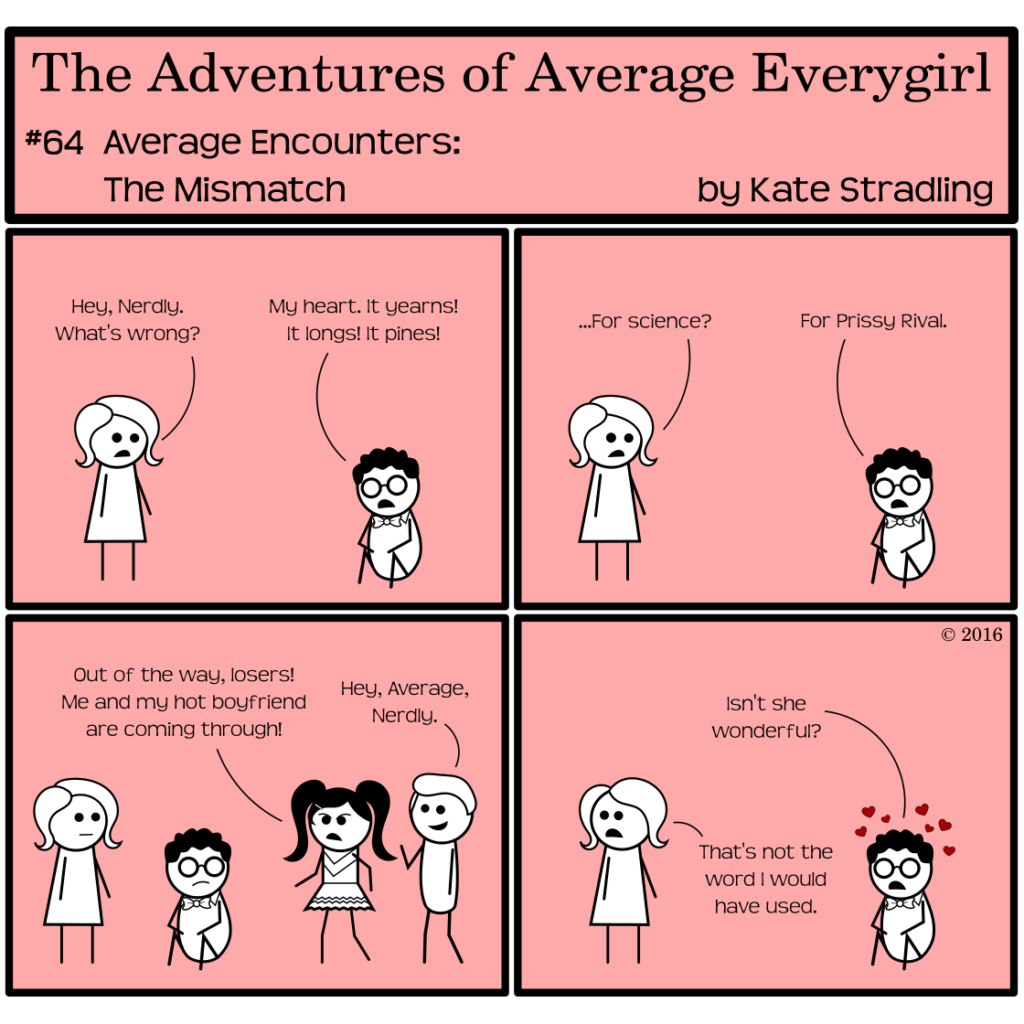
Unrequited love is a literary staple. When a pure-hearted character yearns for the object of their adoration, this can become a driving force for the plot. Sometimes, though, it’s a mismatch, and the audience can tell from the onset that it’ll never work out.
…Or will it?
*cue nail-biting romantic tension*
The Socially Awkward Boy and the Popular Girl
A common motif, especially in teen literature and film, saddles a socially inferior main character with a crush on the most popular person in school. Rarely is that popular person nice to the MC. On the contrary, they can insult, snub, or embarrass those beneath them (or keep company with others who do this, and say nothing), and this behavior passes as—if not acceptable—excusable because they’re popular.
The mismatched crush plays a heavy role in a string of 1980s films: Sixteen Candles (1984), Some Kind of Wonderful (1987), Can’t Buy Me Love (1987), Say Anything (1989), and so forth. The oddball couple appeals, apparently, to a wide cross-section of viewers. Maybe it fosters hope within our shriveled hearts that one day, we too can connect with someone who is by all measurable standards out of our league.
A Toxic Mismatch
If the socially superior individual is kind, the pairing makes sense and becomes endearing. If they’re a jerk, though, the crush itself becomes questionable.
See, when that’s the case, the Socially Awkward Boy isn’t actually in love with the Popular Girl. He’s in love with a figment of his imagination, the shadow that he expects her to be rather than the person that she really is.
“But she was super nice to me this one time!”
(Which magically negates the many encounters with her that have left him feeling like garbage.)
Popularity is a strange beast. We act differently one-on-one than we do in groups, where the herd mentality all too readily takes over. Sometimes, it seems like the outsider yearning for the prom queen really just wants that person’s popularity and social acceptance, and they see a relationship as the obvious means of acquiring that. “If this person loves me, I’m of equal value to them, and everyone else will love me too.”
If only life worked that way.
Characters who pin their worth on what others feel for them will ultimately end up miserable—if not in the course of the story, then in the unwritten years that extend beyond. True value comes from within, and it exists regardless of whether the popular girl three rows up in math class thinks you’re cute.
Which brings me to the ultimate Socially Awkward Teen movie:
Napoleon Dynamite (2004)
This film takes ’80s teen movie clichés and either magnifies or twists them, to hilarious effect. Most particularly, the Socially Awkward Boy with a crush on the Popular Girl mismatch gets three different treatments:
- Napoleon and Trisha: I’m not even sure that Napoleon recognizes Trisha’s popularity. They’re in the Happy Hands Club together, and she’s friends with Summer Wheatly, but it’s almost like he chooses her at random to ask to the dance. And when she ditches him there, he doesn’t seem to give her a second thought. No heartbreak, no pining, no thirst for revenge. So refreshing!
- Pedro and Summer: Predictably, Popular Girl Summer turns down Socially Awkward Pedro’s invitation to the dance. We can presume that she was already set to go with her preppy boyfriend Don, but she doesn’t have the courtesy to make excuses. She flat-out rejects the transfer student via Napoleon, who breaks the news in a less-than-gentle manner, only to discover that—plot twist!—Pedro doesn’t care because he also asked Shy Girl Deb. Props to the socially awkward playa!
- Kip and Lafawnduh: Socially Awkward Kip connects online with his soulmate, who is so far out of his league that they really should be playing different games. I will admit, Lafawnduh is probably my favorite character in this film. She’s kind-hearted, composed, confident, and she gets what she wants. Plus, she supplies the crucial quest item for Napoleon’s final battle. Kip is basically the luckiest nerd on the planet, with a mismatch that actually works out.
Final Word on the Mismatch
As we see, the Mismatch can have multiple outcomes. It invites entertainment, angst, drama, and soul-searching. When poorly executed, though, it can leave its audience cold.
Verdict: Use with caution.
Things are getting serious.
Oh yes they are.
Comments are closed.